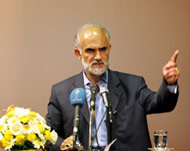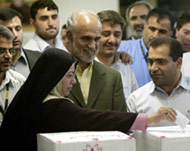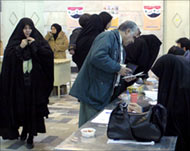Iranians vote in presidential poll
Iranians have voted in a high-stakes presidential election, turning out in large numbers.

The election could be the closest presidential race since the 1979 Islamic Revolution.
None of the seven candidates is expected to get the 50% support needed to win outright, meaning the two top vote-getters will likely meet in a runoff vote.
Voting was extended by two hours to 9pm (1630 GMT) – and then for another hour until 10pm (1730 GMT), an indication that turnout was high.
Iran‘s supreme leader Ayat Allah Ali Khamenei had earlier urged the 46.7 million eligible voters to flood the polling stations as a slap to critics – particularly US President George Bush, who a day earlier called the election undemocratic and designed to keep clerics in power.
They do not want an Islamic country to have a real democratic system, said Khamenei. “Bush’s comments will only make our people more stubborn to vote in big numbers,” he said.
There were no official reports yet on turnout.
|
“Bush’s comments will only make our people more stubborn to vote in big numbers” |
Friday’s election marks the end of eight years of frustrated efforts by President Mohammad Khatami to reform the 26-year-old theocracy, and leading contender Akbar Hashemi Rafsanjani is hoping his image as a pragmatic cleric with clout can attract voters who are tired of political deadlock.
The top cleric, who has already twice served as Iran’s president, has also been presenting himself as a man opposed to “extremists”, open to restoring ties with the US and eager to ease international tensions over the country’s nuclear programme.
US President George Bush, however, has charged that the election in the Middle East’s most populous nation “ignores the basic requirements of democracy”.
“Iran’s rulers denied more than a thousand people who put themselves forward as candidates, including popular reformers and women who have done so much for the cause of freedom and democracy in Iran,” said Bush.
Based on hostility
Foreign Ministry spokesman Hamid Reza Assefi said Bush’s statements were based on hostility and animosity towards Iran, and that Washington “should hardly be worrying about democracy because its main allies are dictatorships”.
 |
|
Reformist Mostafa Moin is |
He added that all political tendencies in Iran were represented in the election. “We have seven candidates while there are usually only two or three in the United States and you have to be either Democrat or Republican to be elected.”
The election, which a month ago looked like a one-horse race, now looks set to be the tightest in Iran’s history. The number of people who bother to vote will be closely watched.
None of the seven candidates is expected to score more than 50% of the vote, and Rafsanjani may be forced into an unprecedented second round run-off with either reformist doctor Mostafa Moin or hardline former police chief Mohammad Baqer Qalibaf.
Even though candidates have been pre-screened and the real power will remain in the hands of Iran’s unelected and deeply conservative supreme leader Ayat Allah Ali Khamenei, the seven contenders are offering vastly different political visions.
Regime veteran
Unlike Khamenei, Rafsanjani is a cleric who favours economic liberalisation and closer ties with the West – even if he once branded Bush a “bird-brained dinosaur”.
 |
|
Mostafa Moin (C) watches his wife |
The silver-haired regime veteran, who served as the middle man in the Iran-Contra weapons for hostages scandal with the US in the 1980s, has been campaigning as a savvy deal-maker, who could steer Iran out of international isolation.
But Rafsanjani remains the target of allegations that he has amassed a huge private fortune, and it remains to be seen if a 70-year-old can appeal to a country where 70% of the population is under 30.
Reformist hopes
Moin – initially disqualified from standing but approved amid fear of a mass boycott of the polls – has promised to free political prisoners, challenge the powers of unelected hardliners such as Khamenei and name a cabinet dominated by dissident leftists.
Moin’s supporters are hoping for an upset similar to Khatami’s spectacular 1997 landslide win, even though the wave of popular euphoria that brought Khatami to power has long dissipated, as hopes for far-reaching reform were dashed and the president’s own weakness was highlighted in the face of powerful hardliners.
 |
|
Security has been tightened for |
The hope for the reform camp is that young voters, tempted to boycott out of apathy or disgust at the political system, will be persuaded to cast their ballots at the last minute.
The main hardline challenger is Qalibaf, a former police chief and veteran Revolutionary Guards commander, who has reinvented himself as a smiling technocrat in a suit and a fresh face.
He is promising a bread-and-butter focus in a country rich in oil and gas but dogged by inflation and high unemployment.
His critics have cast him as a favourite of Khamenei and have reignited memories of his alleged support for a violent crackdown on pro-democracy demonstrators in 1999.
Security will also be tight, amid fears of a repeat of the bomb attacks that killed up to 10 people nearly a week ago.
Tens of thousands of police are set to be on patrol on election day, with 20,000 in Tehran alone.